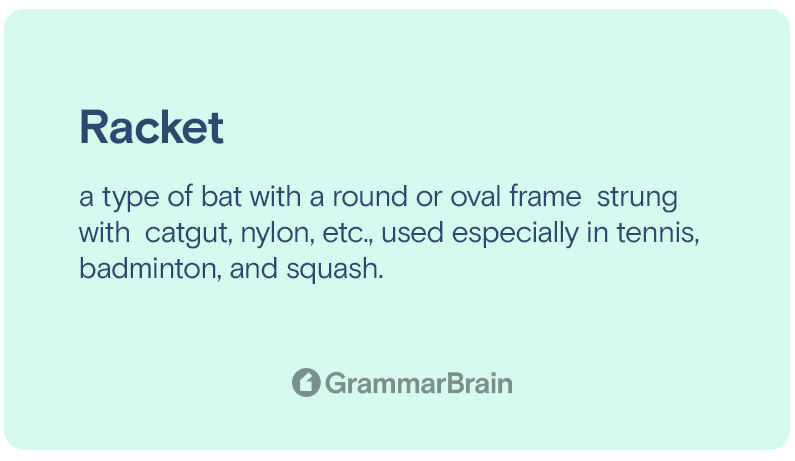What is the difference between a racquet and a racket? These homonyms can get confusing in the English language. They sound alike, although hold very different meanings. Learn the key differences between these two words in this short guide.
What is the difference between racquet and racket?
To play the sport of Badminton, you use a bat made in the shape of a circular net with a metal border. This instrument is a racquet or racket. The game is simple. There are two to four players who face each other in pairs, who then hit a cock of feathers with the racket bat at each other scoring points per strike. While “racket” is how the Americans spell it, “racquet” is how the Britishers have spelled it for decades, and by most countries that follow the Queen’s English.
The spelling does not affect their pronunciation. Although the specific origin of the word is mostly unclear, it is similar to the French word “Raquette.” Nevertheless, the International Tennis Federation uses the spelling racket.
| Word | Definition |
| Racket (noun) /ˈrakət/ | a type of bat with a round or oval frame strung with catgut, nylon, etc., used especially in tennis, badminton, and squash. |
| Raquet | a type of bat with a round or oval frame strung with catgut, nylon, etc., used especially in tennis, badminton, and squash. |
Apart from badminton- tennis, squash, and table tennis are racket games. For each of these sports, the rackets are structurally distinctive and have different wiring.
Tennis is similar to badminton. Similarly, in squash, you hit with a ball and play against a single player. You hit the ball against the wall which ricochets off to the opponent. While squash is the hardest sport, it is not very popular.
On the other hand, tennis is more popular and it is considered a sport for the elites and also the oldest game.

Racket vs. racquet: key differences
However, a racket can also mean a loud, troublesome noise. It can even describe a commotion in a group or some disturbance. Politically, it also refers to an event or a scandal involving money. However, the British spelling for racquet has no other meaning outside its reference to sports.
History of “racketing”
The game with rackets could likely have started in British prisons. Conversely, it may have had some traces of Indian and Chinese cultures.
British army officers played this game in British India when badminton became a proper sport. Eventually, it was called a “ladies sport,” as women were seen playing this sport in long gowns and hats using rackets made of wood.
Rackets nowadays are more sturdy turning the sport from a feminine game into an aggressive, competitive sport.
Currently, there are a variety of rackets available for a variety of players ranging from professionals to amateurs to people who play the sport as a hobby. You chose a racket depending on its size in inches. Paralympics Sports are popular too and amazingly, they use professional rackets with minute changes.
Racket to use
To use this in a sentence, you can say, “I have to buy a new set of rackets for the Sports event at my workplace.”
To describe a loud noise, you can say, “The kids made a racket when taking their seats on the bus.”
“After hearing the news of the untimely death of the actress, there was a racket of mourners outside her house.” Here, racket describes a commotion. The word “racket” used to describe a political disturbance can be used like this-
“The politician had to resign following the Insider Trading Racket”
or
“The police were involved in a money laundering racket.”
In conclusion, a racket is a sports instrument with varying functions. A quote by Nick Tosches says “Life is a racket. Writing is a racket. Sincerity is a racket. Everything’s a racket.”
Inside this article
Fact checked:
Content is rigorously reviewed by a team of qualified and experienced fact checkers. Fact checkers review articles for factual accuracy, relevance, and timeliness. Learn more.
Core lessons
Glossary
- Abstract Noun
- Accusative Case
- Anecdote
- Antonym
- Active Sentence
- Adverb
- Adjective
- Allegory
- Alliteration
- Adjective Clause
- Adjective Phrase
- Ampersand
- Anastrophe
- Adverbial Clause
- Appositive Phrase
- Clause
- Compound Adjective
- Complex Sentence
- Compound Words
- Compound Predicate
- Common Noun
- Comparative Adjective
- Comparative and Superlative
- Compound Noun
- Compound Subject
- Compound Sentence
- Copular Verb
- Collective Noun
- Colloquialism
- Conciseness
- Consonance
- Conditional
- Concrete Noun
- Conjunction
- Conjugation
- Conditional Sentence
- Comma Splice
- Correlative Conjunction
- Coordinating Conjunction
- Coordinate Adjective
- Cumulative Adjective
- Dative Case
- Determiner
- Declarative Sentence
- Declarative Statement
- Direct Object Pronoun
- Direct Object
- Diction
- Diphthong
- Dangling Modifier
- Demonstrative Pronoun
- Demonstrative Adjective
- Direct Characterization
- Definite Article
- Doublespeak
- False Dilemma Fallacy
- Future Perfect Progressive
- Future Simple
- Future Perfect Continuous
- Future Perfect
- First Conditional
- Irregular Adjective
- Irregular Verb
- Imperative Sentence
- Indefinite Article
- Intransitive Verb
- Introductory Phrase
- Indefinite Pronoun
- Indirect Characterization
- Interrogative Sentence
- Intensive Pronoun
- Inanimate Object
- Indefinite Tense
- Infinitive Phrase
- Interjection
- Intensifier
- Infinitive
- Indicative Mood
- Participle
- Parallelism
- Prepositional Phrase
- Past Simple Tense
- Past Continuous Tense
- Past Perfect Tense
- Past Progressive Tense
- Present Simple Tense
- Present Perfect Tense
- Personal Pronoun
- Personification
- Persuasive Writing
- Parallel Structure
- Phrasal Verb
- Predicate Adjective
- Predicate Nominative
- Phonetic Language
- Plural Noun
- Punctuation
- Punctuation Marks
- Preposition
- Preposition of Place
- Parts of Speech
- Possessive Adjective
- Possessive Determiner
- Possessive Case
- Possessive Noun
- Proper Adjective
- Proper Noun
- Present Participle
- Prefix
- Predicate



